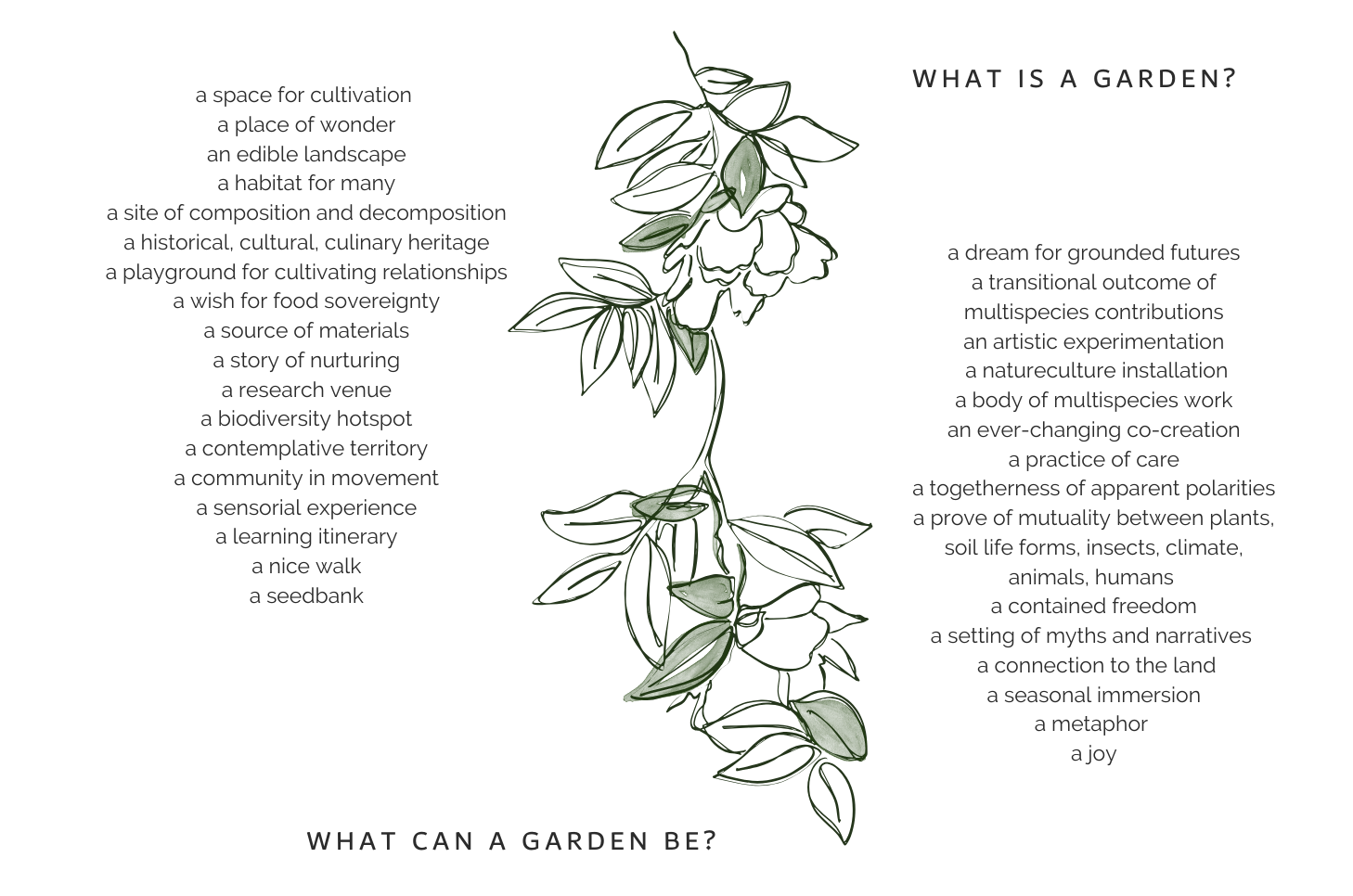Thinking with a garden
What worlds do gardens make possible? What potential futures can gardens enliven? If gardens are expressions of what we are tending and how, could gardens be partners in reimagining human becoming and our work in the world?
If everything came from the earth (things we eat, wear, build, sleep on, in and under), if most of what we are grateful for in our daily lives initially grew in a garden, a forest garden, a planetary garden — in the context of regenerative practices, what can we learn from gardens as multispecies world-making sites?
Thinking with a garden is an in-place residency series and a platform for cross-pollinated research and practice in the expanded field and contact zone between arts, regenerative food systems, spatial practices and ecologies. Residencies unfold as collective practice, research projects, workshops, installations, planting formats, public talks and other interventions in the physical location of Foresta-in-becoming in Asturias. Our vision is that it will offer a frame to cultivate life-generating contact with this place and its inhabitants, nurture multispecies communities, reciprocity, and care for ecological relations.
Thinking with a garden unfolds within 3 lines of research: Architectures of Connection, FoodScapes, and Forest Gardens.
Place
Thinking tools
Thinking of a garden perhaps in its historical meaning as a protected space where 'nature' is designed and maintained by 'humans' to serve our needs, we cannot but find similarities with how the entire planet has become such a place for us. Planetary ecosystems have been impacted and manipulated by the human animal to an extent, where it is no longer possible to dismiss our role as the keystone species on the planetary scale.
Planetary Garden as a thinking tool offers an interesting shift of attention from an anthropocentric obsession to thinking from the plants' perspectives, or even more broadly — from a multispecies perspective. Initially the term has been offered by Gilles Clement, as a protected space of the Earth's biosphere, where plants could feel at home in new territories as long as they find local climate favourable, and where multispecies coexistence in delicate and interconnected relationships becomes possible, human being a steward, a gardener of biodiversity.
Forest garden has also been a vital thinking partner for us over the past years. A human-designed space, indeed a garden, yet also conceived not to need us longer term, a living polyorganism where individual agency is only relevant as part of biodiversity's symphony, as a collective of humming voices that speak of abundance and mutualism — a forest. So much we can learn here: of ourselves, our relational spaces, of complex living systems we are part of.
These are our initial thinking tools in the process of landing in a place with Foresta, while sitting and walking with questions like what will this place become, what does it want to become, what do we wish for it to become with our hopeful practice. These thinking tools will expand, evolve, or may go through other metamorphic forces as more people will join us to think with a garden together.
Calendar
2025
8-9 March
Foresta Planting sessions
(Forest Gardens series)
1-2 March
Foresta Planting sessions
(Forest Gardens series)
28 February — 7 March
Studio Inscape — Architecture in Relation
(Architectures of Connection series)
22-23 February
Foresta Planting sessions
(Forest Gardens series)
10-22 February
Alberto Roncelli — Regenerative living practices in rural areas
(Architectures of Connection series)
24 January - 4 February
Mascha Fehse — Energetic Entanglements: locality, energy, and the labor of nourishment
(Architectures of Connection and FoodScapes series)
2024
31 October - 3 November
Jaime Otero Páramo — Todo se siembra. Everything can be seeded
(Forest Gardens series)
24-27 October
A collective residency for spatial practitioners — Place-listening and Idea-seeding
(Architectures of Connection series)
21-28 October
Wilde Flora — Savouring geographies of food
(FoodScapes series)
13-31 October
Roman Joliy — An agropoetic Pavillion
(Architectures of Connection series)
Apply
(at the moment invitation only, but if you feel the resonance please register your interest writing to flow.slow.grow @ gmail.com)















